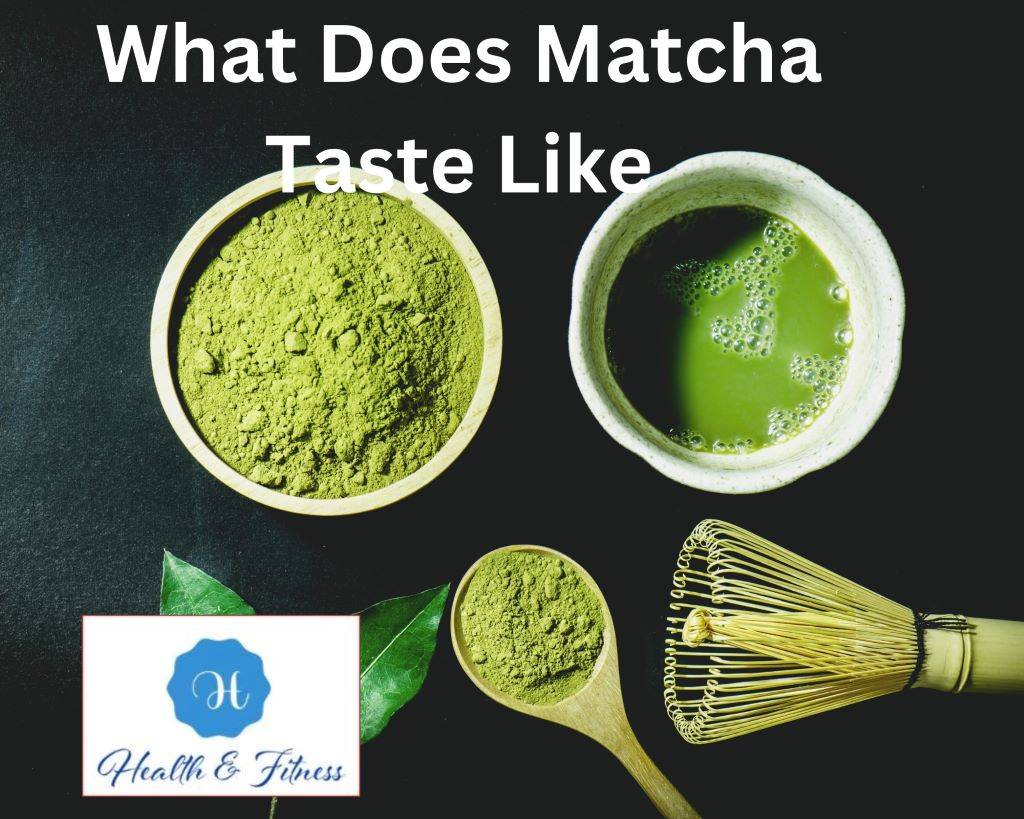Discover the unique flavours of matcha green tea. Explore what matcha tastes like, its vibrant notes, and how to savour this exquisite beverage.
Introduction to What Does Matcha Taste Like
When the question arises, “What Does Matcha Taste Like?”, the answer isn’t trivial. This exotic and captivating Japanese tea has been the talk of the town for some time. Welcome, curious tea enthusiasts, to an exciting journey into the enchanting world of Matcha! If you’ve ever wondered about the taste of this vibrant green elixir, you’re in for a delightful exploration of its unique flavours. In this article, we’ll investigate “What Does Matcha Taste Like?” and uncover the nuances that make this powdered green tea an exquisite sensory experience, and it’s time to explore its distinctive taste.
Understanding Matcha: More Than Just a Beverage
Before we embark on our flavorful adventure, let’s take a moment to understand what Matcha truly is. Matcha Green Tea is a special type of tea that originated in Japan, renowned for its vivid green hue and powdered form. In contrast to traditional steeped teas, grinding shade-grown tea leaves using a traditional granite stone mill creates Matcha, a fine powder. This preparation method results in a distinctive flavour profile that sets Matcha apart from other teas.
A Symphony of Flavors: The Taste of Matcha
Umami – The Fifth Taste Sensation
The first sip of Matcha introduces the enchanting world of umami, the fifth taste sensation. Umami, often described as savoury or “deliciousness,” is one hallmark of Matcha’s taste. It offers a depth and complexity that captures your taste buds in a symphony of flavours. L-theanine, plentiful in shade-grown tea leaves, gives Matcha its umami flavour. The combination of L-theanine and caffeine in Matcha creates a unique flavour balance, enhancing the overall taste experience.
Vegetal Notes
Matcha’s taste is deeply rooted in its origins as a green tea. You’ll experience prominent vegetal notes that evoke the freshness of tender tea leaves. Imagine the essence of freshly cut grass or the earthy aroma of a spring garden. These vegetal undertones add a refreshing aspect to the overall flavour profile. The tea’s vegetal character is a testament to its high chlorophyll content, a result of the shading process during cultivation.
Creaminess
A velvety texture is another delightful aspect of Matcha’s taste. This smooth mouthfeel results from the finely ground tea leaves, which, when whisked into hot water, create a rich texture. The creaminess of Matcha adds a luxurious dimension to the drinking experience, elevating it to a level of indulgence that leaves a lasting impression.
Slight Astringency
You might detect a subtle astringency in Matcha’s taste, especially when it’s prepared with a higher concentration of tea powder. This astringency adds a touch of complexity, creating a balanced interplay of flavours that intrigue the palate. It is essential to note that the degree of astringency can vary based on the tea’s quality and preparation method. However, this aspect is well-balanced with the tea’s other flavours, contributing to the overall appeal of Matcha.
Natural Sweetness
Matcha possesses a natural sweetness that lingers after each sip. The sweetness is gentle and understated, complementing the other flavours and enhancing the overall harmony of the tea. This natural sweetness is a result of the tea’s growing and production process, as well as its unique combination of amino acids and catechins.
Bitter Undertones
In some instances, Matcha may exhibit faint bitter undertones. This bitterness is a result of the tea’s natural composition and can vary based on factors such as the tea’s quality, preparation method, and personal taste preferences. It’s worth noting that the bitterness is usually well-balanced with the other flavours, contributing to the complexity of Matcha’s taste. Some tea connoisseurs appreciate the subtle bitterness as it adds depth to the overall flavour profile.
Unlocking the Taste of Matcha: How to Enjoy it Best
The unique taste of Matcha opens up a world of possibilities for creating delightful beverages and culinary delights. Here are some popular ways to enjoy Matcha:
Traditional Matcha Tea Ceremony
Immerse yourself in the elegance of a traditional Matcha tea ceremony. Experience the art of whisking Matcha into a frothy concoction and savouring each moment as you embrace the rich flavours and cultural significance of this ancient practice.
Matcha Lattes and Smoothies
Blend Matcha into creamy lattes or refreshing smoothies for a modern twist on this classic tea. The combination of Matcha’s taste with milk or plant-based alternatives creates a delightful beverage that’s perfect for any time of the day. Experiment with sweeteners like honey or agave to enhance the tea’s natural sweetness further.
Matcha-infused desserts
Experiment with Matcha in desserts like cakes, cookies, and ice cream. The earthy and sweet notes of Matcha add a unique dimension to sweet treats, making them a delightful indulgence for your taste buds. Incorporate Matcha powder into frosting, batter, or glazes for an enticing green tea-infused dessert experience.
Matcha Culinary Adventures
Take your culinary skills to new heights with savoury dishes infused with Matcha. From Matcha-infused sauces to seasoning blends, explore the versatility of Matcha in enhancing the flavours of your favourite recipes. Try adding Matcha powder to rice dishes, marinades, or salad dressings for a touch of green magic.
Frequently Asked Question: What Does Matcha Taste Like?
Q: What Does Matcha Taste Like?
A: The taste of Matcha can be described as a captivating symphony of flavours. It boasts a distinct umami sensation, offering a savoury and delightful experience. With prominent vegetal notes, Matcha captures the essence of fresh tea leaves and evokes the feeling of being surrounded by nature. The tea’s creamy texture adds a luxurious touch, making each sip a velvety treat for the palate. While some batches may have a subtle astringency, Matcha surprises with a gentle natural sweetness that complements its other flavours. Occasionally, you may detect faint bitter undertones, contributing to the tea’s complexity. Overall, the taste of Matcha is a harmonious fusion of flavours that leaves a lasting impression.
Q: I find Matcha too bitter. How can I hone it taste?”
A: If you find your Matcha too bitter, it might be because of the quality of the Matcha you’re using, or you may be using water that’s too hot. Use high-quality ceremonial-grade Matcha and just-below-boiling water.
Q: Does adding milk or sweetener change the taste of Matcha?”
A: Yes, adding milk or sweetener can change the taste of Matcha. Adding milk can make Matcha creamier and smoother while adding a sweetener can help balance out any bitterness.
Q: Can I use Matcha in cooking, and what does it taste like?”
A: Yes, you can use Matcha in cooking. Culinary grade Matcha is often used in recipes like cakes, smoothies, and ice creams. It adds a unique flavour and a beautiful green colour to the dishes.
Conclusion for What Does Matcha Taste Like
In conclusion, the taste of Matcha is a captivating experience that blends umami, vegetal notes, creaminess, and a touch of sweetness. It offers a sensory adventure that can be appreciated in traditional tea ceremonies, modern beverages, delectable desserts, and creative culinary masterpieces. So, embrace the journey and savour the unique flavours of Matcha, allowing it to whisk you away to a world of tea-infused delight!
Note: The taste of Matcha can vary based on factors such as the tea’s grade, origin, and preparation method. Each cup of Matcha offers a unique experience, making every encounter with this powdered green tea a cherished discovery.
Reference
Matcha: Benefits, Side Effects, and Preparations” by Healthline Link: https://www.healthline.com/nutrition/matcha-green-tea

Adel Galal is a health and wellness writer with over 30 years of experience studying and writing about health, fitness, nutrition, and healthy living. He is the founder of NextFitLife.com, where he shares practical, evidence-based guidance to support long-term health at any age. Adel’s mission is simple:
to help people make smarter health choices that fit real life, at any age.



